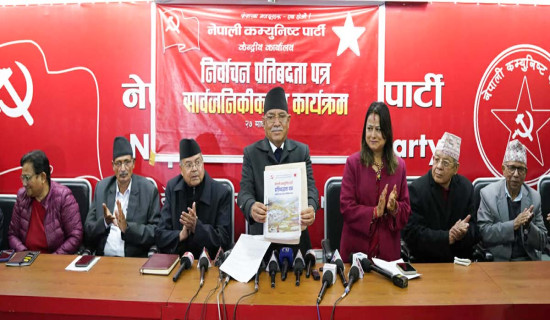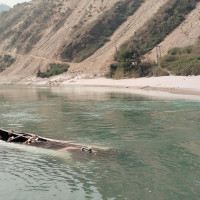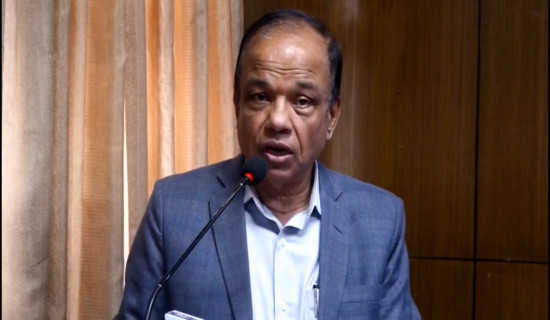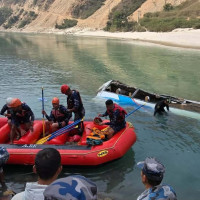- Wednesday, 11 February 2026
Herculean Tasks Before Government
When a British historian, Lord Acton (1887), said, “Power corrupts, and absolute power corrupts absolutely," he did not mean that this would apply only to those who are in political power in the usual sense. He argued that the same moral standards can be applied to all individuals, including those in positions of power. There is no denying that power lies in all spheres of life – politics, economy and culture.
This dictum applies to a recent unfortunate event that took place in Nepal. The political forces that had emerged with the end of the autocratic regime in 1990, followed by a republican form of government in 2006, have been forcibly overthrown from the positions of power after the two-day uprising of promising youths of Nepal, popularly known as Gen Z group. This was quite an unanticipated incident that caused an upheaval of unprecedented magnitude. Nepal indeed had never experienced such a destructive movement that had killed about 74 people, including those in the armed forces. It demolished the public and private property of an indeterminable amount. Fabulous though it seemed, it could be regarded as an epoch-making event in the country's political annals.
Formidable episodes
There might be several reasons for this misfortune. One immediate cause was seen on the surface – two dozen social media platforms were prohibited for the reason of being unregistered in Nepal. Although it may not be the chief reason, it nevertheless triggered the upcoming formidable episodes. Nearly two dozen innocent youths were killed on the first day, a sacred blood sacrifice for a transient cause, which in turn became the next cause of the second day's massive destruction of life and property. The first cause triggered the martyrdom of Gen Z youths, which accelerated the traitorous destruction of public and private property of a poor nation.
Different reactions have surfaced after the second day of destruction. Whereas the first-day killing of innocent people brought parliament-elected Prime Minister’s ruling mandate almost to zero, the destruction of public property even after the resignation of Prime Minister has raised a grave question – whether the Gen Z youths themselves were involved or other criminals who did it to fish in the troubled waters penetrated. While the Gen Z leaders have denied their involvement in demolishing the key governance buildings, which seems apparently true, the second possibility is most likely.
After a few days of misfortune, a revered judicial personality has been appointed as the executive head, who was previously part of a political group during the autocratic regime. Except for the active involvement in an ideologically motivated democratic political group in her early judicial career, the interim Prime Minister Sushila Karki has left an impression of being a critical, non-partisan, impartial person in state affairs during her judicial days. Despite the limited functions of the interim government, she has to perform at least three stupendous tasks before the election.
First and foremost, the newly appointed Prime Minister has to console the bereaved family of the dead with emotional and financial support to make them feel assured that the state is responsible for its citizens. Not only this, the promising youths of Nepal are expecting employment opportunities for those with competence and good performance, based on free and fair competition. This is a possible task if tactfully managed in time.
Second, it is tough, if not impossible, to identify and punish criminals in accordance with the country's laws, rules, and regulations. To accomplish this task, she needs to enable the state machinery to bring those involved in burning the public physical assets and official archives to ashes, which are supposed to be kept safe for an indefinite period of time. As she herself declared it a criminal offence in her first address while assuming the office of the Prime Minister, this has become a tough challenge for her.
Third, this is an opportune moment to amend the constitution, keeping the necessary things intact and removing the redundant ones. This task is just as complicated as the second one, specifically in the context that at least eight political parties have challenged the first move of dissolving the democratically elected House of Representatives, the political parties which have been working for a long time with political doctrines of democracy and socialism, even though some of their top leaders are allegedly decadent in democratic values and principles.
Herein lies the crux of the problem: is it justifiable to act for the gain of something tangible, such as employment and physical comfort, at the cost of intangible values of civilization and culture? Is it the right thing to alter the entire constitution simply because the political executives are incompetent, dishonest, and irresponsible in their tasks? Can the new government guarantee that the new officials of the state machinery will be able to work fairly and independently, being impartial and non-partisan in any case? These issues should not be overlooked, just as the genuine voices of Gen-Z youths cannot be unheard.
Zero tolerance for corruption
Gen Z leaders consistently claim that they have not sought an alternative to democracy. Their most explicit slogan is zero tolerance for corruption and complete enactment of good governance. For this, a state needs both repressive and ideological state apparatuses. It is a well-known assumption that no state runs without them. Lois Althusser (1918-1990) distinguished between them – police, army, and judiciary as repressive state apparatuses to punish those who violate laws, and schools, universities, religious and political institutions to inculcate the values and principles of morality into the minds of citizens.
We can be assured that the first thing can be done partially even within a short period of time, but the second initiative takes quite a long time, which the six-month mandated government may not accomplish. Therefore, a lingering danger that these things may not happen still hangs over the newly appointed Prime Minister's head. People have such a high opinion about her that if she fails to deliver the people’s expectations, she has to undergo a precarious balance of authority. Our responsibility is to cooperate with her to restore the lost credibility of leaders and turn the disturbance into the regular rhythm of governance, keeping all such things in balance while taking initiatives to alter.
(The author is the chairman of Molung Foundation. bhupadhamala@gmail.com)





-square-thumb.jpg)


-square-thumb.jpg)








